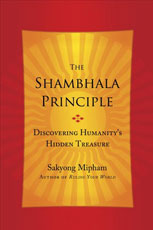Sakyong Mipham is the head of the Shambhala lineage of Tibetan Buddhism whose mission is to create an enlightened society in everyday life. Blending Eastern wisdom with Western perspectives, he explores this Buddhist path to happiness as espoused and passed on to him by his legendary father Chogyam Trungpa Rinpoche, the renowned meditation master, poet, scholar, and artist. Sakyong Mipham's previous books include Running with the Mind of Meditation, Ruling Your World, and Turning the Mind into an Ally. For more information, visit his website at www.sakyo.com.
Sakyong Mipham was 24 years old when his father died, but by then he had participated in many enlightening dialogues with him about the basic tenets and teachings of Shambhala. The core message is that human beings can do marvelous things once they tap into their basic goodness and decency and draw from their inner treasure trove of positive character qualities. This is a far different starting point than the one promoted by religions that emphasize sin, evil, self-loathing, and the many failings of human beings. In the Shambhala tradition, open hearts, kindness, and care are viewed as precious personal resources to be tapped in our efforts to mend a worried and war-torn world.
After some introductory chapters, the book is organized into teachings on Feeling, Being, and Touching. One of the best things about this thematic structure is that it enables Sakyong Mipham to delve into some of the slogans which animated his father's work. There is a Tibetan proverb that says whenever difficult situations arise, the good becomes better and the bad becomes worse. Or as Chogyam Trungpa Rinpoche put it: "Chaos is good." Another one of his gems: "Be where you are and who you are. That's how to cheer yourself up." We can lose a lot of energy by giving others the power to determine whether we are happy or sad. We are challenged to take seriously the power of our own minds. Whenever as a child Sakyong got overwhelmed, his father would say to him: "Keep it simple." By this slogan, Chogyam Trungpa Rinpoche was admonishing his son to maintain confidence in his own inner strengths.
This author offers this spiritual practice to close the book:
"Now I ask you to touch your heart, feel your courage, intelligence, and kindness, and join me in proclaiming the basic goodness of humanity. By doing this, we are unfurling humanity's new flag, our collective conviction in human worthiness, the force that will change the future of our planet."
